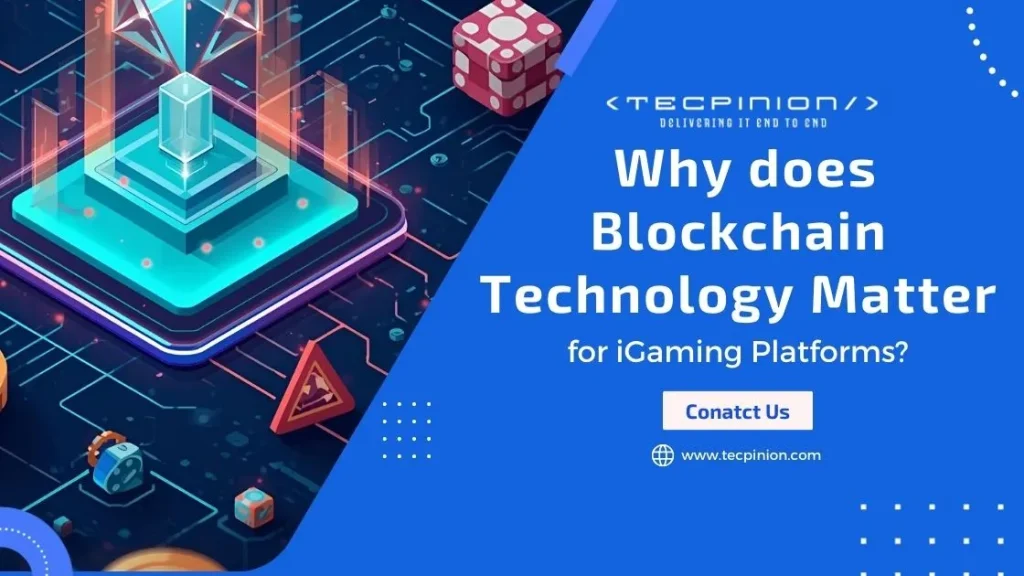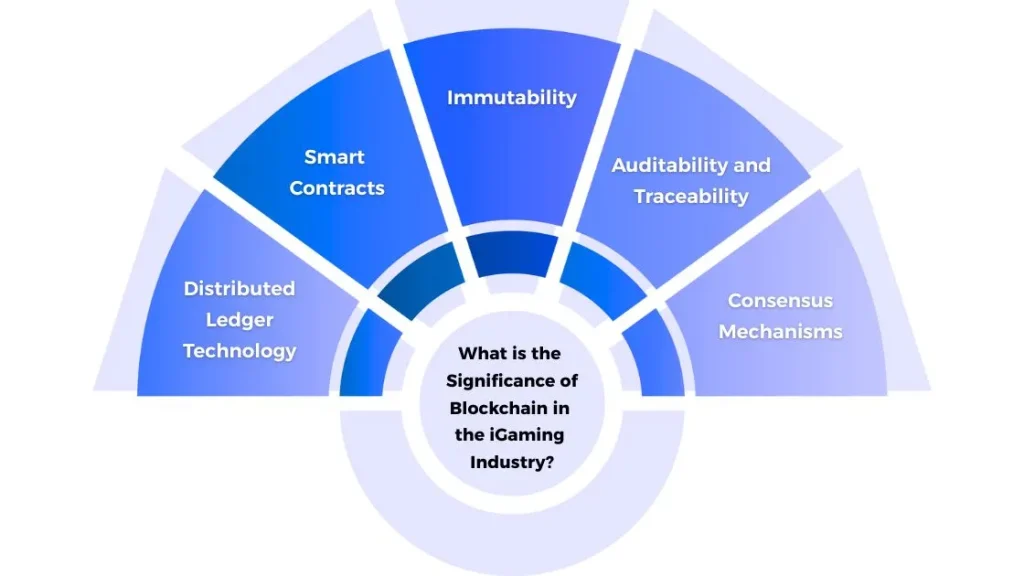How Blockchain Technology Builds Trust and Transparency in iGaming

Table of Contents
- Introduction
- What is Blockchain Technology?
- Why does Trust and Transparency Matter in iGaming?
- Key Features of Blockchain that Ensure Transparency
- Role of Crypto Currency in Blockchain Technology
- How do Operators and Players benefit from Blockchain Technology?
- Challenges and Limitations in Widespread Adoption
- Future Trend of Blockchain in iGaming
- Conclusion
- Tecpinion: An Ideal Choice for your Blockchain-Driven iGaming Solutions
- FAQs
Introduction
Blockchain Technology has revolutionized the functioning of modern iGaming software. Now, let’s understand the increasing impact of blockchain technology and its role in reshaping the current iGaming market.
The iGaming industry has been experiencing exponential growth over the past few years. Due to its rising popularity and hidden growth potential, it has attracted many operators and businesses to enter its dynamic gaming landscapes.
Why is Blockchain Technology Considered Necessary?
Market Stats
The Global Market of Blockchain Technology is currently valued at USD 31.18 billion and is expected to reach USD 393.42 billion by 2032 with a CAGR of 43.65 %.
What is Blockchain Technology?

Blockchain is a decentralized digital ledger system that stores and verifies transactions across multiple computers, making it secure and transparent. The decentralized nature of blockchain technology has effectively resolved trust issues among platform users.
Blockchain technology has paved the way to eliminating fraud, improving the gaming experience for its players, and upholding game fairness.
Attributes of Blockchain Technology:
- Decentralized System – Not a single governing body controls it entirely, and the data is distributed among all participating computers or nodes.
- Immutable Records – Once the transaction is recorded in a block, it can’t be modified or changed, keeping the data safe.
- Transparency – All transactions are visible to every participant, making verification less complex.
- Security – The blockchain iGaming platform has sophisticated cryptography that protects transactions and prevents fraud.
- Consensus Mechanisms – These mechanisms help maintain the ledger’s integrity by ensuring all users abide by the rules.
Why Trust and Transparency Matter in iGaming?
The growing acceptance of the iGaming industry has increased the number of users on the platform. However, with the steady rise in illegal gambling websites, it has become necessary for iGaming platforms to gain the trust and confidence of their new users.
What is the significance of trust and transparency in the iGaming business?
-
Fair Gameplay:
1. Blockchain iGaming platform encourages users to play confidently.
2. Transparency regarding game rules drives more engagement.
3. Transparency builds strong trust, contributing massively to retention rates. -
Protection and Security:
1. It facilitates responsible gambling practices.
2. Players feel assured about their deposits and withdrawals.
3. It enhances players' overall well-being with the platform. -
Regulatory Compliance:
1. Adhering to global jurisdiction makes the platform more trustworthy for the users.
2. It builds credibility among both players and regulatory bodies.
3. Regulatory Compliance can boost platform sustainability. -
Reputation and Loyalty:
1. A recognized iGaming solution can attract players from diverse markets.
2. Trust can convert new users into long-term customers.
3. It can further boost platform productivity and business performance. -
Combating Fraud and Illicit Activity:
1. Transparency reduces the risk of scams, money laundering, and hidden fees.
2. Responsible gaming features retain players' trust with the platform.
3. Anti-money laundering measures help maintain the integrity of the platform among users.
Key Features of Blockchain that Ensure Transparency
Blockchain is often referred to as financial technology, which processes secure global payments. However, blockchain iGaming has revolutionized as players can verify game fairness without blindly believing operators’ promises.
What is the significance of blockchain in the iGaming industry?

- Distributed Ledger Technology:
- All participants can view transaction records.
- It reduces the probability of a hidden altercation.
- No single authority possesses complete control.
- Immutability:
- Once the transaction is validated and recorded, it remains unfiltered.
- Cryptographic links detect illicit activities and keep data more secure.
- It enables a permanent, verifiable record for the operators..
- Smart Contracts:
- Self-executing programs that enforce agreements without third-party interference,
- It ensures transparency in rules with no hidden agendas or terms.
- The winning amount is immediately transferred to player wallets.
- Auditability and Traceability:
- All transactions are permanently recorded and are easy to track.
- Authentic transaction records simplify compliance and audits.
- Players can independently review payment history to ensure transparency.
- Consensus Mechanisms:
- It prevents fraudulent and manipulative acts by any single participant.
- Transactions are verifiable and are open to public access.
- It fosters accountability of the data and the platform.
Role of Crypto Currency in Blockchain Technology
So, what role does cryptocurrency play in blockchain technology? The use of popular cryptocurrencies such as Bitcoin and Ethereum is one of the emerging trends in iGaming. There are a few benefits that cryptocurrencies offer over traditional payment systems.
1. Medium of Exchange:
- They are digital currencies used in blockchain networks.
- This allows for peer-to-peer transactions without intermediaries like banks.
2. Incentive Mechanisms:
- They reward miners or validators who use computing power to maintain and secure the blockchain. For Example:
1. Proof of Work (POW): Miners get rewarded for doing complex computations.
2. Proof of Stake (POS): Validators earn coins for validating transactions.
3. Smart Contracts and DApps:
- iGaming platforms using Ethereum are required to pay gas fees to execute smart contracts.
- They end up utilizing a fair share of network resources.
- Cryptocurrencies tighten security, making it difficult for hackers to manipulate transactions.
- This makes illicit activity very much impossible.
5. Governance & Participation:
- Digital Currencies have been used as governance tokens in many blockchain projects.
- It gives holders the right to vote on upgrades, proposals, and protocol changes.
Would You Like to Explore More about Sweepstakes Casino ?
How do Operators and Players Benefit from Blockchain Technology?
Adapting blockchain technology has benefited players and operators as it introduces fairness, efficiency, and trust in the iGaming ecosystem.
It has successfully reduced fraud, operational costs, and automated processes for operators. The players benefit from provably fair games, faster payouts, and enhanced privacy.
Benefit for Operators:
-
Strengthens Credibility:
Transparency in transaction records builds trust and attracts and retains more users for the platform.
-
Improves Cost Efficiency:
Automation process through smart contracts reduces operational and transaction costs without the need for third-party interference.
-
Enhanced Security:
Distributing data across the networks eliminates the risk of manipulations, chargeback fraud, and money laundering.
-
Regulatory Compliance:
The immutable ledger nullifies the possibility of fines as it provides regulators with evidence of compliance.
-
Global Reach:
Blockchain Technology supports various digital currencies, helping operators to enter the international market.
Benefits for Players:
-
Promote Fair Play :
It verifies the fairness of every game to ensure unbiased and tamper-proof game results.
-
Security and Privacy :
The decentralized nature of the ledger safeguards its players' financial and personal data.
-
Faster Withdrawals:
The use of cryptocurrencies on blockchain ensures faster cashout compared to traditional banking.
-
Anonymity:
Cryptocurrencies give players greater anonymity, allowing them to preserve anonymity and hide their transactions.
-
Trust in Platform.:
Once players become aware that operators have no control over game outcomes and funds, it builds confidence and allows them to pay freely.
Is Blockchain easy to integrate, or does it pose any challenges for operators? Let’s find out, moving forward.
Challenges and Limitations in Widespread Adoption
While incorporating blockchain technology offers numerous benefits for iGaming software and operators, one must not completely rule out its challenges and limitations in widespread adoption.
The following are the constraints and challenges to consider when implementing blockchain in iGaming.
- Regulatory Uncertainty:
- Different countries have their own jurisdictions for blockchain-based sites and cryptocurrencies.
- Lack of uniformity in the regulatory framework makes it difficult to expand globally.
- Scalability Concerns:
- Public blockchains like Bitcoin and Ethereum are unsuitable for high-volume applications and industries.
- Slower transactions and high speed can negatively impact user experience.
- High Energy Consumption:
- The Blockchain iGaming mechanisms utilize high energy.
- This leads to sustainability issues, which need to be addressed by incorporating this into a large-scale iGaming platform.
- User Awareness:
- Most players are unaware of blockchain and cryptocurrencies.
- Complexity can impact user interest with the platform.
- Integration Costs:
- Implementing blockchain requires significant investment in infrastructure and technical expertise.
- Integration costs might not be affordable to many smaller operators.
Even as such a problem persists with blockchain technology, there still lies scope for improvements in the future. To understand this better, let’s look into the future trends of blockchain in iGaming.
Need an iGaming Platform Powered by AI ?
Future Trend of Blockchain in iGaming
The future of Blockchain in iGaming is to boost transparency, security, and player empowerment, which is more crucial for the iGaming industry’s growth.
-
Provably Fair Gaming:
Cryptographic algorithms on blockchain will enable players to verify fairness in every game outcome. While some platforms have already adopted this mechanism, it is expected to become an industry standard very soon.
-
NFTs in Gaming:
It represents Non-Fungible Tokens that are used in game assets and player rewards. It opens up the secondary market, allowing players to buy, sell, and exchange digital assets, giving rise to new economic and revenue systems.
-
Decentralise Casinos:
Decentralized casinos mean players share their opinion on platform governance, including game selection, rule modifications, and profit distribution. This model gives more control over the platform.
-
RegTech and Compliance Automation:
Regulators might be willing to use blockchain to oversee real-time transactions, enabling fair and lawful transactions.
-
Faster and Cheaper Transactions:
The advanced solutions in the future will improve scalability, making instant withdrawals and deposits possible for even large-scale applications.
Conclusion
Blockchain Technology has played a significant role in developing modern iGaming software. It has also been an effective tool in resolving the trust issues, which have been a growing concern among the users. The decentralized system ensures that the player’s data is well-protected, safe, and secure.
The operators have also benefited from adopting blockchain technology as it builds credibility, lowers transactional and operational costs, enhances security, and gives the platform a global reach.
The core features, such as Digital Ledger Technology, Immutability, Smart Contracts, Auditability, and Consensus Mechanisms, have ensured transparency and have been built within players and operators. There are a lot of positives to integrating blockchain into the iGaming platform.
Some constraints and limitations make it slightly more challenging for operators to achieve widespread adoption. However, blockchain technology’s future looks very bright, as it is still evolving. The future advancements can increase its efficiency and make the integration process much easier.
Tecpinion: An ideal Choice for Your Blockchain-driven iGaming Solutions
Looking for an iGaming Software Development Provider ?
FAQs
- What exactly is Blockchain Technology?
Blockchain is a decentralized digital ledger system that stores and verifies transactions across multiple computers, making it secure and transparent.
- What is the biggest problem with Blockchain?
The limitations of adopting blockchain technology include scalability issues, integration complexity, and high energy consumption.
- What is the difference between Bitcoin and Blockchain?
Blockchain is a distributed ledger technology with a decentralized framework for recording transactions. Bitcoin is the first digital currency to adopt blockchain technology.
- What are the 6 main characteristics of Blockchain?
Blockchain technology's core features and characteristics are Distributed Ledger Technology, Immutability, Smart Contracts, Auditability, Consensus Mechanisms, and Traceability.
- Does Blockchain gaming have a future?
With ecosystem leaders showing trust in the sector, more capital is expected to flow into blockchain projects, leading to the rise of complex and engaging games in the future.

